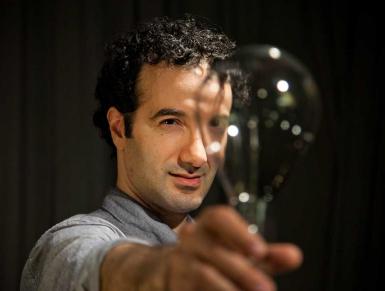Radiolab host Jad Abumrad visits March 21

Radiolab founder and host Jad Abumrad will step out of his usual medium, recorded audio, to address a live audience at 7 p.m. March 21 in the Buskirk-Chumley Theater.
His talk is part of the school’s Speaker Series and is free and open to the public. Tickets are limited, however, and are available online.
Abumrad’s topic is “Gut Churn,” which describes how the creative process inherently involves uncertainty, and that uncertainty can have positive effects.
Abumrad said in a phone interview that he will draw on the development of Radiolab, which he founded in 2002 after studying creative writing and music composition at Oberlin College. There, he developed a strong background in audio, video and multimedia. Radiolab blends Abumrad’s interests in music and storytelling and now reaches more than one million people each week, an audience second only to that of This American Life.
Abumrad said he enjoys giving live lectures because he can see the audience respond.
“When you work in radio, you put all this stuff out there, but you can’t hear it land. It just kind of drifts out into the ether, which can be disconcerting,” he said. “ Onstage, people can laugh, or not laugh, when you want them to. The audience puts this weird pressure on you, which can be kind of magical.”
While he said he does not always receive the reaction he had hoped for from audiences, Abumrad does have a message he tries to deliver with his talk.
“My talk is about giving permission for things to fall apart,” he said. “At its core, it’s about uncertainty and navigating doubt. I want people to leave knowing feelings of doubt aren’t just OK, but they’re beautiful. I want them to learn to love the really hard parts.”
Abumrad said he has had to do just that as he navigates a field he was where he had no academic training: journalism.
“I struggled with knowing if I’d covered enough angles to be able to tell my audiences that something’s true,” he said. “It gets messy when you are trying to do stories like we do and still speak truth. Fair balance and tone are issues I’m learning more about every day.”
While Abumrad said he is still learning best reporting practices when interviewing the country’s first transgender mayor or crafting a scientific perspective piece on the Ebola outbreak, he said his innately musical brain makes the art of telling a story almost second nature.
“Storytelling is a deeply musical act, whether it’s on a page or out of your mouth,” he said. “It involves syncopation, rhythm, pitch — all those things we associate with music and people who get that get storytelling.”
Abumrad said the lack of visual imagery in radio broadcasting and podcasting makes them perfect media for storytelling. They give listeners the opportunity to fill in the gaps in their own mind and take ownership of the story
“If I’m doing my job well, you can’t help but imagine a mini movie in your brain,” Abumrad said. “I trigger an involuntary reflex in you, and we engage in a kind of co-authorship. Radio is really intimate because of that.”
This intimacy is one way Abumrad justifies the recent surge in popularity of podcast, which he calls a “podcasting renaissance.” While he said he’s hopeful for the future of the medium, he is aware there are gaps in the way of measuring audience engagement.
For example, podcasters cannot tell if everyone who downloads their pieces actually listens to them, or if it there is a way for listeners to hear a different ad each time they listen to a podcast they have downloaded.
He said it is also hard to gauge the audience’s feelings about radio broadcasts and podcasts, because often, they are listening while commuting and away from their computers. This makes it less likely for them to publish feedback on the Internet.
Quantifying aside, Radiolab has measurable success in the form of awards and kudos. Since its founding, Radiolab has won two George Foster Peabody Awards, and, in 2011, Abumrad was named a MacArthur Fellow, the award known as the “genius grant.”
Abumrad advises students pursuing a career in radio broadcasting or podcasting to take their future into their own hands and be patient with their progress.
“You don’t need permission to podcast anymore. The tech barriers aren’t there, so don’t wait,” he said. “But give it a minute, too. Getting good takes time. Sometimes, things won’t sound good the fifth or 50th or 500th time. It takes awhile for your skills to catch up with your taste. Do the work and find people you trust to help you, and it will happen eventually.
Abumrad’s visit is supported by the school’s Miriam Meloy Sturgeon Memorial Fund.
More:

